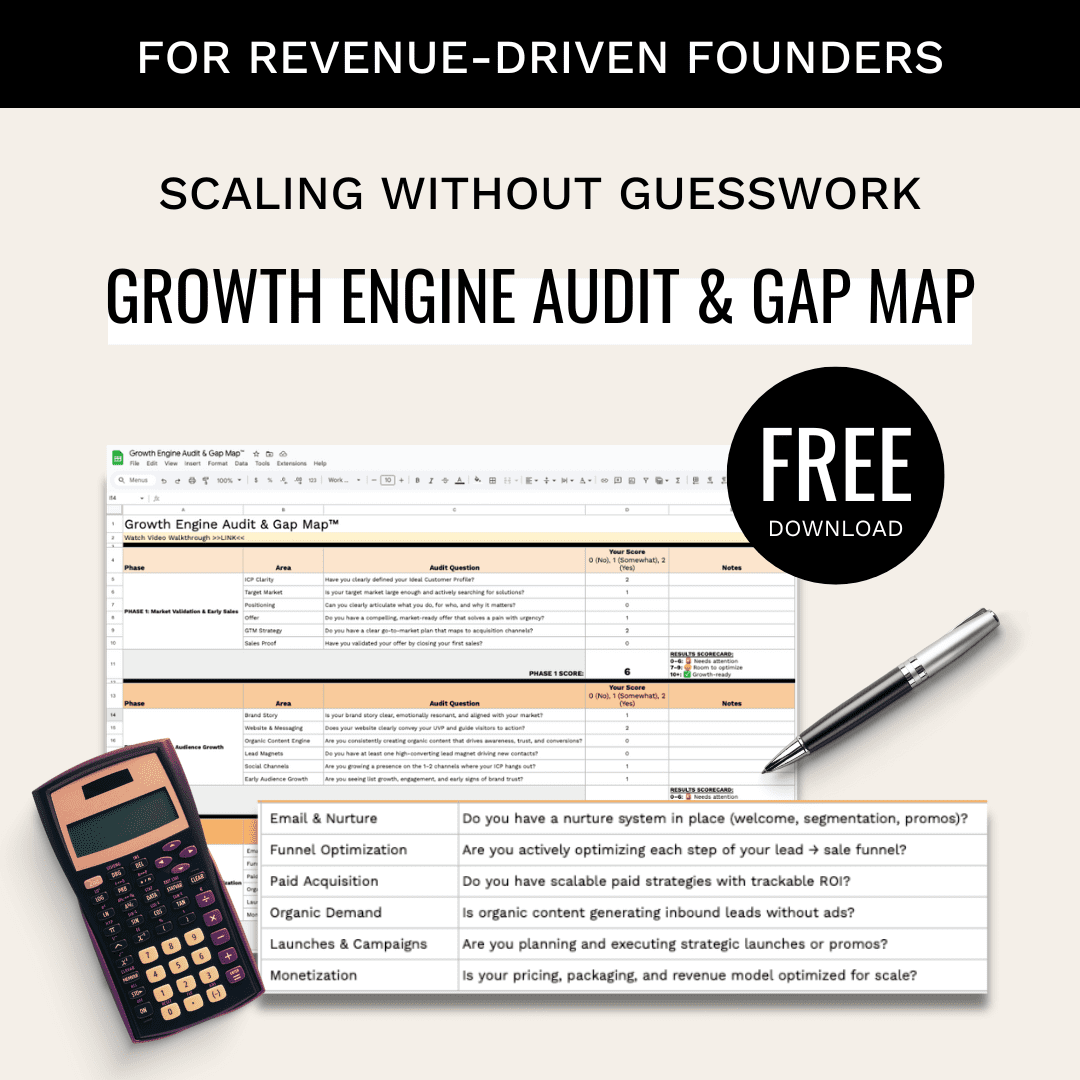If you’re running an AI startup, you’ve probably already discovered that marketing your product isn’t quite like the marketing you see going on with anything else. Traditional marketing strategies often fall flat when you’re trying to reach technical buyers who want hard evidence, not flashy campaigns filled with buzzwords that make their eyes roll. Most fractional CMO companies won’t be able to get you where you’re needing to go because…
Here’s the thing: You need a fractional CMO, but not just any fractional CMO. You need someone who actually gets what you’re building and can speak to the people who’ll buy it. The good news is that there are specialized options out there — you just need to know what to look for.
Understanding Your Fractional CMO Options
Think of choosing a fractional CMO like picking the right tool for a specific job. You wouldn’t use a hammer to fix a computer, right? Well, the same principle applies here. Let me walk you through five distinct types of fractional CMOs, so you can figure out which one actually makes sense for your situation.
The Brand Builder This type focuses on making your startup look professional and polished. They’re great at creating logos, websites, and marketing materials that look impressive in investor meetings. But here’s the catch: They often lack the technical depth to really understand what makes your AI solution special.
Best for: Consumer-facing AI products or startups where you already have strong technical people on your team to handle the complex stuff.
The Growth Hacker These folks are all about fast results and measurable outcomes. They love running experiments, A/B testing everything, and optimizing conversion funnels. If you need quick wins and have a product that sells itself once people try it, this could be your person.
Best for: Startups with short sales cycles and product-led growth strategies.
The Strategy Consultant Think of this type as the big-picture thinker. They’re excellent at market analysis and positioning, but don’t expect them to roll up their sleeves and actually execute campaigns. They’ll tell you what to do, but you’ll need someone else to do it.
Best for: Startups preparing for major funding rounds or trying to break into competitive markets.
The Enterprise Sales Expert If your AI solution is headed for the enterprise market — especially in regulated industries — this specialist knows how to navigate those notoriously long and complex sales cycles. They understand that selling to Fortune 500 companies is a completely different game.
Best for: Startups targeting large enterprise clients with complex decision-making processes.
The Technical Marketing Hybrid Here’s where things get interesting. This rare breed combines deep technical knowledge with solid marketing execution skills. They can actually understand your technology and explain it in ways that make sense to buyers.
Best for: Startups with sophisticated AI solutions that need both technical credibility and growth momentum. Your choice in fractional CMO companies should reflect that.
Startup Marketing, AI SEO, and the Future of Brand Visibility, A Conversation with Andrea Palten
Deep Dive: Fractional CMO Companies by Type & What They Bring to the Table
Let me break down fractional CMO companies by type – and what you’re really getting with each approach, because the devil is always in the details.
1. The Brand Builder: When Polish Matters Most
CMOs from these fractional CMO companies come from traditional marketing backgrounds — think advertising agencies or consumer brands. They’re the people who can make your startup look like it belongs in the same conversation as the big players.
What they’re really good at:
- Creating consistent visual identity across all your materials
- Crafting compelling company stories that investors love
- Building brand awareness through PR and partnerships
- Managing creative campaigns that get attention
Where they struggle:
- Understanding the technical nuances of your AI solution
- Creating content that resonates with technical buyers
- Explaining complex algorithms or data processing capabilities
- Supporting sales conversations that get into technical details
The reality check: If you’re building computer vision software for manufacturing, a Brand Builder might describe it as "AI that sees problems before they happen." That sounds nice in a pitch deck, but the engineering manager evaluating your solution wants to know about your accuracy rates, training data requirements, and integration complexity.
When it makes sense: You’ve got a consumer-facing AI product, or you’re in a space where brand perception really matters (think AI for creative industries). Also works if you already have strong technical people internally who can handle the deep-dive conversations.
2. The Growth Hacker: Speed and Data Over Everything
Growth Hackers within fractional CMO companies live in spreadsheets and testing platforms. They’re constantly running experiments, tweaking conversion funnels, and optimizing every step of your customer journey.
What they excel at:
- Fast experimentation and rapid iteration
- Converting website visitors into trial users
- Optimizing onboarding flows and user engagement metrics
- Finding scalable customer acquisition channels quickly
- Using data to make decisions, not gut feelings
Where they hit walls:
- Long, complex B2B sales cycles (think 6-12 months)
- Products that require extensive technical evaluation
- Content marketing that builds long-term credibility
- Supporting enterprise sales teams with technical materials
The reality check: Growth Hackers are fantastic if someone can try your AI tool in five minutes and see the value immediately. But if your solution requires a proof-of-concept deployment, security reviews, and technical integration discussions, their rapid-fire approach might not match your buyers’ journey.
When it works: Your AI product has a self-service component, short evaluation periods, or clear immediate value (like AI-powered productivity tools or self-service AI tools for developers).
3. The Strategy Consultant: Big Picture, Less Execution
These are the former McKinsey type of fractional CMO companies who love frameworks, market analysis, and positioning documents. They’re brilliant at seeing the forest, but they might not help you plant the trees.
Their strengths:
- Comprehensive competitive analysis
- Market sizing and opportunity assessment
- Go-to-market strategy development
- Pricing and business model optimization
- Positioning that differentiates you in crowded markets
Their limitations:
- Limited hands-on execution capabilities
- Often expensive for ongoing marketing needs
- May not understand the day-to-day reality of startup marketing
- Strategies might be too theoretical for immediate implementation
The reality check: You’ll get a beautiful strategy document and clear frameworks, but you’ll still need someone to actually execute the campaigns, create the content, and manage the day-to-day marketing operations.
When it’s worth it: You’re at an inflection point — preparing for Series A, entering new markets, or need to clarify your positioning before scaling. Also valuable if you have internal execution capabilities but need strategic direction.
sbb-itb-e8c8399
4. The Enterprise Sales Expert: For When Deals Take Forever
These fractional CMO companies understand that enterprise software sales are a marathon, not a sprint. They’ve been through the procurement processes, security reviews, and committee decisions that define enterprise sales.
What they bring:
- Account-based marketing expertise
- Understanding of complex B2B buyer journeys
- Experience with compliance and security requirements
- Sales enablement materials that actually help close deals
- Patience for 12+ month sales cycles
Where they’re less helpful:
- Building broad market awareness
- Product-led growth marketing strategies
- Rapid experimentation and optimization
- Consumer or SMB marketing approaches
The reality check: If you’re selling AI solutions to Fortune 500 companies, you need someone who understands that the CISO, CTO, and procurement team all have different concerns. Your marketing needs to address security, compliance, integration complexity, and business impact — often for multiple stakeholders.
When you need them: Your AI solution targets large enterprises, especially in regulated industries like healthcare, finance, or government. Also crucial if your average deal size is high and involves multiple decision-makers.
5. The Technical Marketing Hybrid: The Rare Unicorn
This is the approach that combines deep technical understanding with marketing execution skills. Think someone who can read your model architecture documentation and then create a campaign that converts enterprise prospects.
What makes them different:
- CMOs from these fractional CMO companies actually understand your technology at a technical level
- Speaks the language of your engineering team and your prospects
- Creates content that builds credibility with technical audiences
- Balances technical accuracy with marketing effectiveness
- Understands both product development cycles and marketing timelines
The unique value:
- No learning curve — they get your product immediately
- Can participate in technical sales conversations
- Creates marketing materials that your sales team trusts
- Builds campaigns that resonate with technical buyers
- Bridges the gap between product and marketing teams
When it’s essential: You’re building complex AI/ML solutions for technical buyers, your product requires deep explanation (think data platforms, data pipelines, or AI infrastructure), or you need marketing leadership that can grow with your technical sophistication.
The Data-Mania Approach: Bridging Enterprise and Startup Worlds
At Data-Mania, my approach represents the ultimate evolution of the Technical Marketing Hybrid model. At its core, I’m a hybrid between a product marketing expert and a growth marketing expert — but with a unique positioning that spans both Fortune 100 enterprises and early-stage startups.
What Makes This Different
CMOs from most fractional CMO companies come from either the enterprise world or the startup world. Few have successfully operated in both. Here’s what sets this approach apart:
Enterprise-Grade Technical Depth Having supported Fortune 100 companies with deep tech marketing needs means understanding how complex technical solutions get evaluated, procured, and implemented at scale. This isn’t just about creating pretty marketing materials — it’s about understanding technical architectures, compliance requirements, and how CIOs actually make decisions about AI investments.
Startup Growth Velocity Working with SaaS startups on product-led growth (PLG) approaches and product-market fit (PMF) validation brings a completely different skill set. This is about rapid experimentation, conversion optimization, and finding scalable growth channels when resources are limited and every dollar counts.
Cross-Vertical Expertise Experience across diverse business models — from career marketplaces to MQL campaigns for consulting giants like Accenture and BMC — means understanding that every technical product has unique market dynamics. What works for a developer tool doesn’t work for an enterprise AI platform.
Where This Fits in the Spectrum
If you look at the five CMO types, most represent trade-offs: you get either strategic thinking or execution, either enterprise expertise or startup agility, either technical depth or marketing velocity.
The Data-Mania approach eliminates these trade-offs by combining:
- Product marketing precision (understanding technical differentiation and positioning)
- Growth marketing velocity (rapid testing and optimization)
- Enterprise credibility (experience with complex sales cycles and technical buyers)
- Startup efficiency (making every marketing dollar count)
For AI startups, this means you get someone who can:
- Speak to your engineering team’s technical realities while designing campaigns that actually convert prospects
- Understand enterprise procurement processes but also know how to validate PMF through rapid growth experiments
- Create technical content that builds credibility with CTOs and data scientists while optimizing conversion funnels for maximum efficiency
- Navigate complex B2B sales cycles while implementing PLG strategies that reduce customer acquisition costs
The practical impact: Instead of choosing between someone who "gets" your technology or someone who can drive growth, you get both. Instead of hiring a strategist who doesn’t execute or a tactician who doesn’t think strategically, you get integrated strategy and execution.
When This Approach Wins
This hybrid approach is particularly valuable for AI startups that are:
- Targeting both technical and business buyers in the same organization
- Scaling from startup to enterprise customers without losing early growth momentum
- Building complex products that require both technical accuracy and compelling business cases
- Operating in competitive markets where technical credibility and growth velocity are equally critical
The reality is that most AI startups can’t afford to get marketing wrong. You need someone who understands your technology deeply enough to maintain credibility with technical buyers, but who also has the growth marketing expertise to scale efficiently. That combination is rare — but it’s exactly what the modern AI startup landscape demands.
Making the Right Choice: A Framework for Decision
Here’s how to think through which approach actually fits your situation:
Start with your audience:
- Technical buyers (CTOs, data scientists, engineers): Technical Marketing Hybrid or Enterprise Sales Expert
- Business buyers (executives, managers): Brand Builder or Strategy Consultant
- End users (individual professionals): Growth Hacker or Brand Builder
Consider your sales cycle:
- Days to weeks: Growth Hacker
- Weeks to months: Brand Builder or Technical Marketing Hybrid
- Months to years: Enterprise Sales Expert or Strategy Consultant
Evaluate your product complexity:
- Simple value proposition: Brand Builder or Growth Hacker
- Moderate complexity: Strategy Consultant or Growth Hacker
- High technical complexity: Technical Marketing Hybrid or Enterprise Sales Expert
Think about your stage:
- Early stage (pre-product-market fit): Strategy Consultant or Technical Marketing Hybrid
- Growth stage (scaling): Growth Hacker or Technical Marketing Hybrid
- Enterprise expansion: Enterprise Sales Expert or Technical Marketing Hybrid
The Hidden Costs of Getting It Wrong
Here’s what nobody talks about: hiring the wrong type of fractional CMO doesn’t just waste money — it can actually set you back months.
When Brand Builders miss the mark: Your marketing looks great but doesn’t convert technical buyers. You end up with expensive campaigns that generate vanity metrics but not qualified leads.
When Growth Hackers fall short: You optimize for the wrong metrics and miss the longer-term relationship building that enterprise sales require. Quick wins become quick losses when deals stall.
When Strategy Consultants overstep: You get beautiful frameworks but no execution. Six months later, you have great positioning documents but still no marketing engine.
When Enterprise Sales Experts are misplaced: You build for enterprise buyers but miss easier-to-convert SMB customers who could fuel faster growth.
The most expensive mistake? Hiring someone who needs 3-6 months to understand your technology before they can be effective. In startup time, that’s an eternity.
Why Technical Marketing Hybrid Often Wins for AI Startups
For most AI startups, the Technical Marketing Hybrid approach offers something you can’t easily find elsewhere — the ability to maintain credibility with technical buyers while actually driving measurable growth.
Here’s why it often makes the most sense:
- No learning curve: They understand your technology from day one
- Credibility with technical buyers: They can participate in technical discussions without embarrassing your sales team
- Balanced approach: They combine strategic thinking with hands-on execution
- Scalable content: They create technical content that educates and converts
- Product-marketing alignment: They understand both technical feasibility and market demand
The investment consideration: Yes, this expertise typically costs more than generalist fractional CMO companies. But consider the alternative cost of hiring someone who needs months of onboarding, creates campaigns that don’t resonate, or can’t support your sales team in technical conversations.
Practical Next Steps
If you’re convinced you need fractional CMO help (and you probably do), here’s how to move forward:
Before you start interviewing:
- Be honest about your sales cycle and target audience
- Understand your technical complexity from a buyer’s perspective
- Define what success looks like in 3, 6, and 12 months using analytics and structured frameworks
- Know your budget for both strategy and execution
During interviews, ask fractional CMO companies these specific questions:
- "How would you explain our AI solution to a technical buyer?"
- "What’s your experience with [your specific type of AI/ML]?"
- "Can you walk me through a campaign you’ve run for a similar product?"
- "How do you balance technical accuracy with marketing effectiveness?"
Red flags to watch for with fractional CMO companies:
- They talk more about their process than understanding your product
- They can’t give specific examples from similar technical products
- They focus only on brand/awareness without discussing conversion
- They seem uncomfortable with technical details or want to "simplify everything"
The Bottom Line
Your AI startup deserves marketing leadership that actually understands what you’ve built. The days of "fake it till you make it" marketing are over — technical buyers are too sophisticated, and the competition is too fierce.
The question isn’t whether you can afford specialized expertise. The question is whether you can afford to waste time with someone who doesn’t get it.
For most AI startups, fractional CMO companies that offer the Technical Marketing Hybrid approach offers the rare combination of technical depth and marketing execution that can actually move the needle. It’s not just about finding any fractional CMO — it’s about finding the right one for the unique challenges of marketing AI solutions.
Your technology is sophisticated. Your marketing should be too.
FAQs
What fractional CMO companies are right for my AI startup?
When choosing a fractional CMO for your AI startup, it’s important to keep a few critical factors in mind:
- Technical Know-How: Seek someone who not only grasps the intricacies of AI and machine learning but can also translate those complexities into clear, compelling messages for your audience.
- Relevant Track Record: Prioritize candidates with experience engaging technical buyers, navigating enterprise sales cycles, and rolling out AI product marketing strategies.
- Data-Focused Mindset: A great fractional CMO will use analytics and structured frameworks to make informed decisions, ensuring marketing efforts deliver clear, measurable results.
By zeroing in on these qualities, you’ll be better equipped to find a fractional CMO who truly understands your startup’s needs and can help tackle its unique challenges.
What risks could arise if a fractional CMO’s expertise doesn’t align with my AI startup’s needs?
Hiring a fractional CMO who doesn’t align with your AI startup’s objectives can create a host of problems. If they lack the right technical background or understanding of AI, they might find it difficult to clearly convey the value of your product. This can lead to missed opportunities and slower progress in reaching your business goals.
On top of that, fractional CMO companies with a misaligned focus could direct resources toward strategies that don’t connect with your audience or support your go-to-market plan. To truly make an impact, it’s crucial to choose someone with the technical expertise and industry insight needed to deliver measurable results for your startup.
Why is a Technical Marketing Hybrid approach ideal for AI startups compared to traditional marketing methods?
A Technical Marketing Hybrid approach works wonders for AI startups by blending in-depth technical knowledge with smart marketing strategies. This combination ensures that even the most complex AI products are clearly explained and appeal to both technical experts and general audiences. It essentially connects the dots between product development and growth marketing, helping startups align their cutting-edge innovations with what the market actually needs.
Using data-driven strategies and a strong understanding of AI, this approach creates customized plans that speak directly to technical buyers, speed up go-to-market processes, and improve return on investment. It’s an excellent fit for AI startups that require both strategic guidance and practical execution to navigate tricky sales cycles and rise above the competition.
Related Blog Posts
- When Should Startups Hire a Fractional CMO?
- 5 Ways AI Can Optimize Marketing ROI for your Tech Startup
- AI Growth Marketing: Forecasting Use Cases
- Best Fractional CMOs for Tech Startups: 6 Strategic Leaders Driving 100x Growth (2025)




